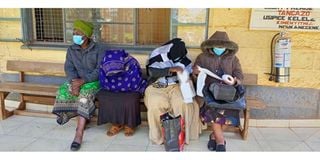School closure leaves girls in danger of FGM, early marriage

FGM suspects outside a Mukurwe-ini court on March 5.
What you need to know:
- Domtila Chesang, the founder of I-Am Responsible Foundation, an organisation that champions against FGM and child marriages in West Pokot, says cases have increased since schools closed.
- Ms Chesang said her organisation is currently handling four FGM cases and a similar number of cases of girls who have been married off.
The closure of schools last month has exposed some girls to female genital mutilation (FGM) and early marriage.
Already, reports of girls being subjected to the cut and forcibly married off have been made in some parts of the country.
Domtila Chesang, the founder of I-Am Responsible Foundation, an organisation that champions against FGM and child marriages in West Pokot, told Nation.Africa that cases have increased in the county since schools closed.
Ms Chesang said her organisation is currently handling four FGM cases and a similar number of cases of girls who have been married off.
“FGM is going on in the area but silently. The major root cause is peer pressure among parents and the girls themselves,” said Ms Chesang.
Safe shelters
She added that cases of child marriage are rampant and mostly undocumented. She cited a girl in their safe shelter who was badly harassed by a group of men for trying to escape from forced marriage.
“Cases of child marriage are very rampant here and very little campaign is happening to end the menace. Many cases are mostly violent because of resistance from the minors, but the community believes that such children should be beaten up,” she said.
The anti-FGM crusader said her organisation is working with the police to rescue and support the victims acquire medical attention and other basic needs.
They are also working through the already constituted community surveillance groups to monitor the situation on the ground. She said one circumciser, three people and two girls have been arrested in connection with the ongoing FGM activities in the area.
Five women and two men were recently arraigned for abetting FGM in Mukurwe-ini, Nyeri County. The suspects appeared before resident magistrate Damacline Bosibori Nyakundi at a Nyeri court after being arrested on Monday.
The court directed that they be detained at Mukurwe-ini Police Station pending a ruling on their bail application.
Police rescued eight girls from a home of a suspect said to have escaped the police dragnet. Of the eight, six are said to have undergone the cut.
The return of FGM in central Kenya has sent shockwaves, with women, girls and gender activists raising concerns.
The region has for more than three decades not witnessed cases of FGM, hence the reemergence is seen as a drawback on the gains that had been made.
Complications
Investigating officer Elizabeth Mwikali told court the suspects were arrested on April 4 after they received reports of bleeding girls who had been rushed to Mukurwe-ini Level 4 Hospital.
So far, no cases have been reported in Kuria since the schools closed. The region has been one of the FGM hotspots. Anti-FGM crusaders and gender experts attribute this development to the commitment by elders to fight the vice.
Last month, elders from the Kuria community vowed to support the war on FGM to bring it to a successful end. They spoke after a three-day sensitisation programme in Isebania town under the theme 'Men End FGM'.
They were drawn from the four Kuria clans of Bugembe, Bwirege, Nyabasi and Bukira. Mr Chacha Rioba, who attended the training, said they learnt the effects of FGM, which, he said, has not only hurt girls’ health but also undermined the region's development.




